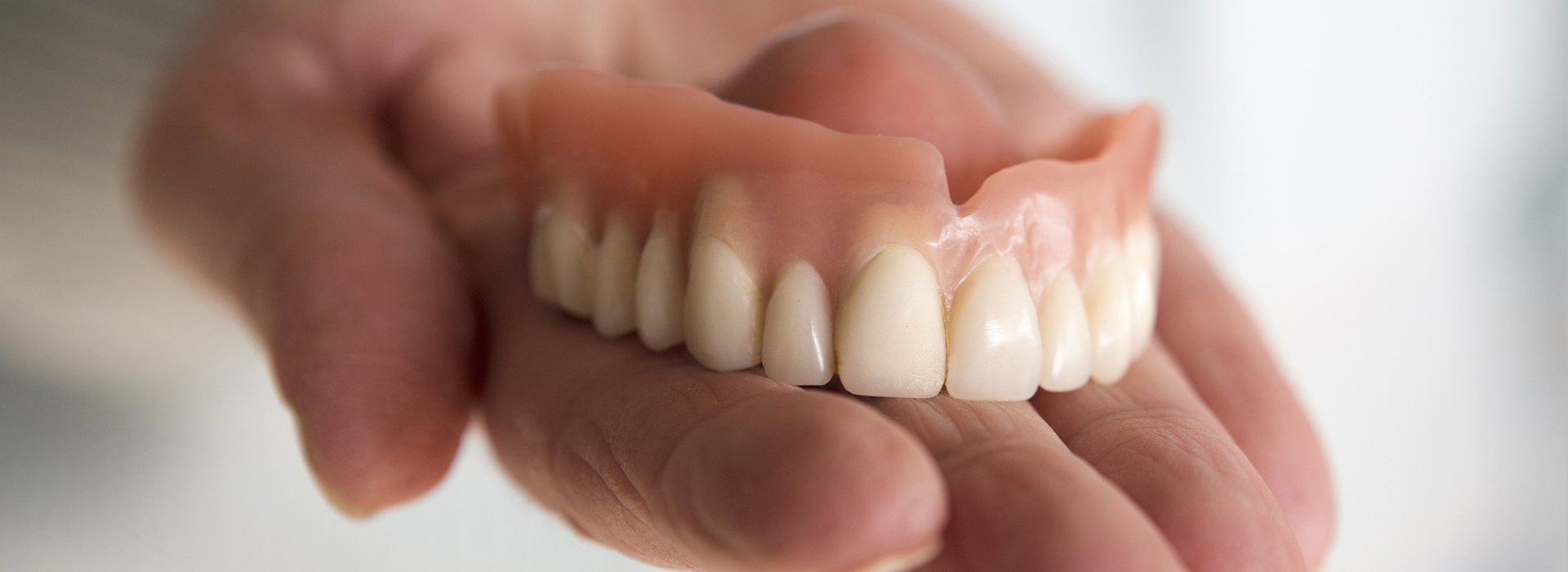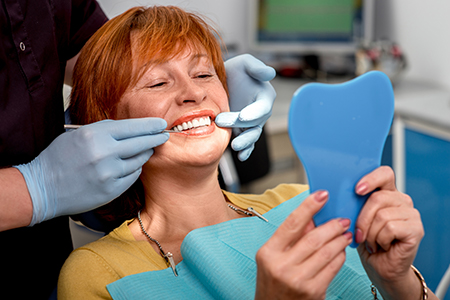New Patients
(860) 218-9463
Existing Patients
(860) 421-0144

Thanks to improvements in dental materials and clinical techniques, replacing missing teeth is more predictable and natural-looking than ever. While dental implants and fixed bridgework provide long-term, fixed solutions, removable dentures continue to be a reliable option for many patients who want restored function and a pleasing appearance. Modern dentures are designed to work with each person's anatomy rather than against it, and they can be an excellent choice for restoring everyday comfort and confidence.
At Newpoint Family Dental, our goal is to deliver dentures that feel and look like a natural part of your mouth. We prioritize careful evaluation, precise laboratory work, and attentive follow-up to help ensure each prosthesis fits well and supports a healthy bite. Throughout the process, our team focuses on both how the denture performs and how it complements your facial features.
We tailor every treatment plan to a patient's unique needs, considering oral health, remaining teeth, jawbone condition, and lifestyle. Whether a patient needs a single partial denture or a full set for both arches, we aim to provide solutions that restore speech, chewing ability, and the confidence to smile freely.
Tooth loss affects more than appearance. Gaps change how the teeth around them function and can lead to shifting, uneven wear, and altered bite forces. Over time, these changes may cause discomfort, difficulty eating, and accelerated wear on healthy teeth. Replacing missing teeth helps reestablish proper occlusion (bite) and distributes chewing forces more evenly across the mouth.
Losing several teeth or an entire arch can also affect facial support. When teeth and their roots are absent, the jawbone can gradually remodel, leading to visible changes in facial contours. Dentures provide external support for the cheeks and lips, helping preserve a more natural profile and reducing the hollowed appearance that can accompany long-term tooth loss.
Beyond physical effects, missing teeth often influence social interactions and self-esteem. Restoring a complete smile can improve speech clarity and make everyday activities — from speaking to sharing a meal — more comfortable and natural. Rehabilitating function and aesthetics together helps patients feel more like themselves again.

Dentures are removable oral appliances made up of two main parts: the prosthetic teeth and the base that supports them. The base is crafted to follow the contours of the gums and underlying bone, providing a stable platform for the artificial teeth. New materials and shading options allow denture teeth to mimic natural translucency and texture, improving overall realism.
A well-fitted denture should be comfortable, allow clear speech, and restore enough chewing ability to maintain a nutritious diet. Because dentures sit on soft tissues, their success depends on careful impressions, precise bite records, and thoughtful design choices that account for each patient’s anatomy and functional patterns.
One advantage of removable dentures is their accessibility for daily hygiene. Dentures can be taken out for cleaning, which makes it easier to maintain the health of residual teeth and soft tissues. Removing the prosthesis nightly also gives the gums an important period of rest.
Choosing between full and partial dentures depends on how many natural teeth remain and the condition of those teeth and surrounding tissues. Our approach begins with a comprehensive oral exam and diagnostic imaging when needed, so we can recommend a design that balances stability, comfort, and cosmetic outcome. We always consider conservative options that preserve healthy tooth structure whenever possible.
Full (complete) dentures are appropriate when an entire upper or lower arch is missing. Partial dentures are designed to fill one or more gaps while using the remaining teeth for support. Modern partial frameworks can be made from several materials — from metal alloys for strength to flexible resins for comfort and esthetics — and they are custom-designed to avoid placing undue stress on the abutment teeth.
Patients with remaining teeth that are compromised by decay or periodontal disease may require extractions or preparatory treatment before a denture is delivered. In other cases, preserving certain teeth to support an overdenture can offer improved retention and stability compared with conventional removable prostheses.
Full dentures replace all of the teeth in an upper or lower arch and are crafted to restore both function and facial support. The final design considers tooth position, gum contours, and bite relationships to create a balanced, comfortable prosthesis that integrates with the patient's speech patterns and facial dynamics.
A conventional full denture is fabricated after healing from extractions is complete, which often yields a more stable long-term fit because the tissues have had time to stabilize. Immediate dentures, by contrast, are placed at the time of extraction so the patient does not go without teeth during the healing period. Immediate prostheses are useful for maintaining appearance and function early on, but refinements or a subsequent conventional denture may be required as the tissues remodel.
Overdentures
An overdenture gains added retention by using remaining tooth roots or specially designed attachments as anchors. This approach can preserve bone in key areas and offers improved stability compared with a conventional denture that relies solely on tissue support.
Implant-Supported Dentures
Implant-supported prostheses attach to dental implants surgically placed in the jaw. Even a small number of implants can dramatically increase retention and reduce movement during chewing and speaking. These hybrid solutions combine the removability of a denture with the security provided by implant attachments.
Partial dentures replace one or more missing teeth and are designed to integrate with the natural dentition. Properly constructed partials not only restore appearance and chewing ability but also help prevent the adjacent teeth from drifting into empty spaces, which can otherwise lead to bite disturbances.
Retention for partial dentures may come from clasps, precision attachments, or a combination of approaches tailored to the patient’s dental anatomy. Modern designs aim to minimize bulk and visibility while maintaining strength, making them more comfortable and discreet than older styles.
When designing a partial denture, we consider each abutment tooth’s health and prognosis. In many cases, strengthening or restoring those teeth before delivery of the partial improves long-term success and comfort.

Craftsmanship and technique are central to producing a denture that functions well. The process typically includes careful impressions, occlusal (bite) records, teeth selection and setup, and clinical try-ins to confirm fit and appearance. Attention to jaw relationships and muscle dynamics helps us avoid interferences that could make the denture uncomfortable or unstable.
Every step offers an opportunity for refinement. Laboratory fabrication combines precise measurements with artistic choices — tooth shape, size, and color are selected to harmonize with facial features. When the denture is inserted, we assess vertical dimension, symmetry, and phonetics to ensure it performs as intended.
Some patients require minor shaping or relines as the gums and bone adapt to the new appliance. Relines are a routine part of long-term denture care because tissues change gradually over time; a well-timed reline restores intimate contact between the base and the gums for improved comfort and function.

Adapting to a new denture is a process that usually takes a few days to a few weeks. It’s common to experience increased saliva production at first and to need time to regain clear speech patterns. Practicing speaking and starting with softer foods will help you rebuild confidence while chewing becomes more natural.
Comfort and adjustments
Minor sore spots can develop as your mouth adjusts. If you experience irritation, continuing to wear the denture until an adjustment appointment can help the clinician identify and relieve pressure areas precisely.
Speaking and eating
Moving forward with regular conversation and practicing reading aloud helps with speech adaptation. Begin with small, soft pieces of food and chew on both sides to distribute pressure. Over time, most patients regain most of their prior chewing function.
Cleaning and nightly care
Rinse dentures after meals and brush them daily with a brush designed for prostheses to remove food and plaque. Periodic soaking in the recommended cleanser helps manage staining and odor.
Continue to clean any remaining natural teeth and gently care for the gums and palate. This supports tissue health and helps the denture maintain an optimal fit.
Remove dentures at night to give the oral tissues a restorative break; this practice supports long-term tissue health.
Stability enhancements
If a denture needs extra retention, options include adhesives, attachments, or implant support to reduce movement and improve comfort. We evaluate each case to recommend the most appropriate measure for added stability.
Follow-up care and routine exams
Regular dental visits let us monitor fit, function, and the health of remaining teeth and soft tissues. Periodic exams are an important part of keeping dentures performing well and identifying any changes that should be addressed early.
Relines and long-term maintenance
As jawbone and tissue contours evolve, relines or repairs help restore a secure, comfortable fit. These services extend the useful life of the prosthesis and sustain oral health.
Our practice is committed to helping patients navigate every stage of denture care, from initial planning through long-term maintenance. If you have questions about how dentures might fit into your treatment goals, please contact us to learn more and arrange a consultation.
Today, it’s easier than ever to replace missing teeth and achieve natural-looking, durable, and long-lasting results! Depending on a patient’s dental needs, lifestyle, expectations of care, and budget, choices can include conventional fixed bridgework, dental implants, or removable partial and complete dentures. At the office of Newpoint Family Dental, we’ll discuss all your options in care and answer all your questions as you choose the solution that’s right for you.
With advances in dental materials and technology, today’s dentures are more comfortable and realistic-looking than ever before.
Whether you wear partial or complete dentures, it’s essential to see the dentist for routine care. Besides checking the fit and condition of your dentures and making any necessary adjustments, you’ll also receive a comprehensive exam to check on the health of any remaining teeth as well as the soft and hard tissues in and around the oral cavity.
A same-day denture offers an accelerated design and fabrication process that allows a patient to go from impression taking to denture insertion in a single day.
For patients who don’t want to wait after having teeth extracted, an immediate denture can be inserted the same day your teeth are removed. Sometime later you may need the denture relined to address any changes in its fit once the extraction sites have completely healed.
While no one wants to drop or break a partial or complete denture, accidents do happen. The good news is that in some cases, your partial or complete denture is reparable. It all depends on the extent of the damage. Don’t hesitate to contact our office if you’ve broken or damaged your denture. We’re happy to help.
The simple act of taking your partial denture in and out can cause certain types of metal clasps to loosen over time. When you come in for your checkup visit or contact our office for an adjustment, we’ll assess the fit of your partial and tighten the clasps for improved stability and comfort.
While rebuilding a complete smile is a worthwhile investment, our office is sensitive to the costs involved in dental care. We customize care and will discuss which treatment options address your needs, lifestyle, and budget. How much a new denture will cost depends on the type of the prosthesis, its design, and the materials used to fabricate the supportive base, teeth, and clasps or precision attachments. Dentures that include the placement of dental implants for added retention and stability typically involve additional costs.
If you have dental insurance, your coverage may include a new or replacement set of dentures. Our staff is happy to review your coverage with you to ensure you are maximizing your insurance benefits while minimizing any out of pocket expenses.
At the office of Newpoint Family Dental, we provide an extensive range of dental services, including the latest and most effective methods to help patients with missing teeth rebuild complete and beautiful smiles. As skilled and experienced professionals, we recognize that every patient is different, and every smile is unique. We’re passionate about what we do and take great pride in providing personalized treatment plans while treating our patients as valued partners in care.
